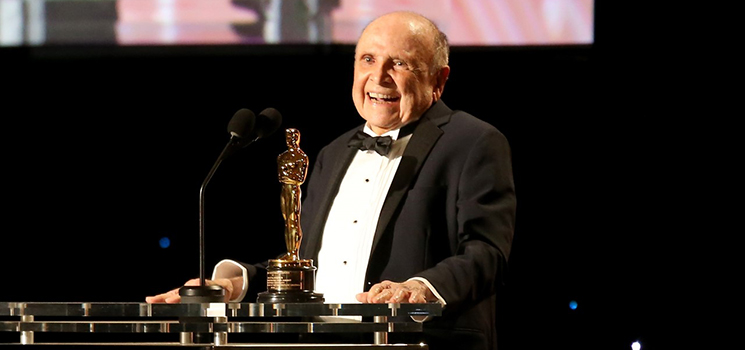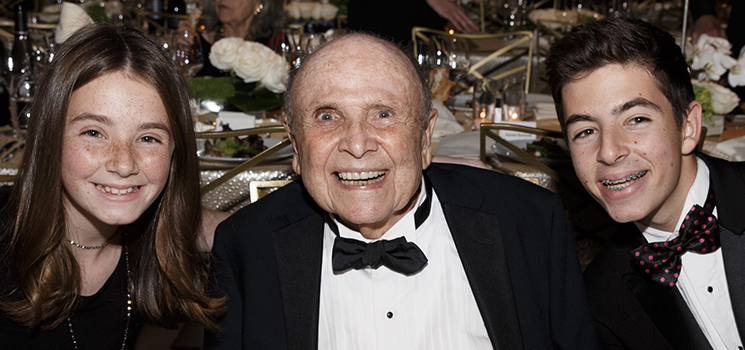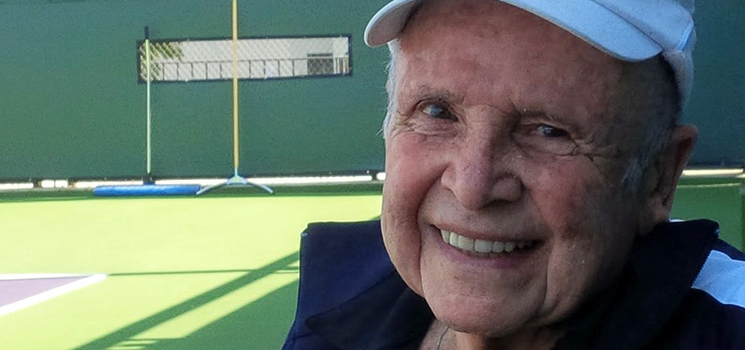News

Open Mind, Open Heart
Casting director Lynn Stalmaster was a giant in Hollywood and at home
By Noela Hueso
In his early years, Lynn Stalmaster (BA ’49, MA ’52) didn’t plan on becoming arguably the most famous casting director in Hollywood history, responsible for finding the actors for such seminal films and TV series as Tootsie (1982), Superman (1978), Roots (1977), Fiddler on the Roof (1971), In the Heat of the Night (1967), West Side Story (1961), The Untouchables (1960) and Gunsmoke (1955), among hundreds of others — or becoming a casting director at all. In fact, as a student at Beverly Hills High School in the 1940s, he had his sights on becoming a performer himself. Radio was initially his medium of choice and when it came time to decide which college he would attend, he had the option of either going to New York City’s American Academy of Dramatic Arts or staying closer to home by attending UCLA’s Theater Arts program. He chose the latter — and it was a decision he never regretted.
“They gave me the opportunity there to play such a variety of roles,” Stalmaster said in 2013, recalling how he played John of Gaunt in the university’s Shakespearean production of Richard II. “I found that I could escape into characters in the theater even though I was still quite shy; the minute I got on stage and the audience was there, I was able to lose myself in the character.”
He performed in a handful of film and TV productions both while at UCLA and after he received his MA, including a small part in the John Wayne film Flying Leathernecks (1951). As much as he loved it, though, he decided that in the long run, he wanted a more “stable” entertainment industry job. He secured a position as a production assistant at Gross-Krasne, a busy Hollywood production company in the 1950s. After a time there, he was unexpectedly asked by producers Jack J. Gross and Philip N. Krasne to assume the duties of their departing casting director, who was retiring. The rest, as they say, is history. He taught himself everything he needed to know about the job and in the process redefined what it meant to be a successful casting director. His background as an actor gave him the insight to approach his work with performers in a way that was different from his predecessors. After a few years with Gross-Krasne, he formed his own independent casting agency. Stalmaster expanded his search for talent beyond Hollywood to New York, Chicago and Europe, and during the course of his five decades in Hollywood, became an early champion of many soon-to-be-famous actors including John Travolta, Jeff Bridges, Christopher Reeve, Dustin Hoffman and Geena Davis, among others.
“He had tremendous empathy for what actors were going through in the audition process,” says Motion Picture Academy President David Rubin, a veteran casting director whose own Hollywood success story was due, in part, to Stalmaster’s guidance and help, and who was instrumental in securing an Honorary Oscar for Stalmaster in 2016. When Stalmaster was coming up in the business as an actor, it wasn’t uncommon for casting directors to feed lines to performers in a “rote, dull, monotone way,” Rubin says, without any real interest in being in the scene. Stalmaster, on the other hand, “read opposite all the auditioning actors; because of his own skill as an actor, he gave them such support…He knew his lines, he made choices about the role he was playing and that gave actors something very specific to respond to and therefore do their best work.”
A kind, authentic man who found it gratifying to help others get their careers started as he had been helped, Stalmaster’s enthusiasm to see people succeed and his willingness to go the extra mile for those he believed in made him a beloved figure in Hollywood.
“He was very encouraging of the people he worked with and gave many opportunities not only to me but also to many others,” Rubin continues. “There is a lineage of entertainment professionals who came out of the Stalmaster casting office with significant careers in the industry.”
Though Stalmaster passed away in February 2021 at the age of 93, his legacy lives on through his family and a new fund they have created to honor his commitment to helping others. The Lynn Stalmaster Fellowship at the UCLA School of Theater, Film and Television, established by Rubin and Stalmaster’s children Lincoln Stalmaster and Lara Beebower, supports an MFA acting or directing student who demonstrates exceptional achievement in character portrayal. With $76,981 received thus far, they are more than three-quarters of the way toward their $100,000 fundraising goal to endow the award by the end of the year.
“Lynn took incredible pride in his connection to UCLA both as an undergraduate and a graduate student,” says Rubin. “This fellowship is a perfect tribute to him and also a great way to honor his loyalty to the school.”


There was a lot to love about Lynn Stalmaster. His daughter called him a “joyful man.” Rubin says he had “an impish, mischievous sense of humor.” Lincoln Stalmaster remembers that “he had a tremendous sense of doing the right thing.” In all he did, Stalmaster approached things with an “open” attitude; indeed, open was one of his favorite words. He was receptive to what every actor brought to the table and didn’t have preconceived notions about how a particular role should be played. He was open in a larger, more meaningful sense, too.
“My dad could not stand intolerance,” Stalmaster continues. “He didn’t take it well when someone made a derogatory comment about another human being regardless of who the person was. Those moments were among the few times I saw him get upset.”
When it came to his work, Stalmaster was particularly adept at convincing others about who he thought should be cast in a particular role. In the aftermath of a casting session, when directors and producers huddled, analyzing and deconstructing what had transpired in the room, Stalmaster held back, silently taking in all their comments.
“Once he took in everyone’s point of view, he was able to come in and bat cleanup,” Rubin says, “approaching his arguments in favor of what he believed, based on what everybody else was thinking.” Taking the temperature of the room, as Stalmaster called it, was “a tremendously valuable piece of professional advice that I’ve used personally, too,” he adds.
When he wasn’t casting films for director greats such as Hal Ashby, John Cassavetes, Blake Edwards, Norman Jewison, Stanley Kramer, Mike Nichols, Sydney Pollack, George Stevens, Billy Wilder, Robert Wise and William Wyler, in his spare time, Stalmaster could be found on the tennis court.
“My father was the most competitive person when it came to tennis. Other than my sister, his grandchildren and me, I don't think there was anything that he loved more,” Stalmaster says, noting that he played competitive games at least two times a week opposite other entertainment industry professionals. “He would travel anywhere to play the right match, with famous tennis players, whoever…it was his obsession.”
But more important to him than any success that he achieved on or off the tennis court, was being a loving, attentive father and later, grandfather.
“He was just as passionate about his family as he was about his work,” Beebower says. “He just loved to come to anything my kids were doing,” she says. “It didn't matter [what it was].”
“Family time was really important to him,” Stalmaster agrees, warmly remembering how, in the ’80s, a particularly busy era for Stalmaster, he made a point of watching sporting events with his son, even if they weren’t in the same room. “If he was in New York and there was a nationally televised football game or tennis match, he would make sure his work was finished for the day before the fourth quarter or fifth set. Then he’d get on the phone with me so we could watch together.”
In later years, Stalmaster was fond of looking back on the projects he had cast and recalling behind-the-scenes moments, which never ceased to impress his children.
“About four or five days before he passed, we were watching an episode of Gunsmoke and suddenly he said, ‘You see this actress? She and her husband used to come over to our house for dinner,’” Stalmaster recalls. “Gunsmoke was in the mid ’50s! He remembered all of it. His memory was incredible.”
After he passed, the tributes came pouring in.
“We got emails and letters from people we'd never met before and they all had the same story,” Beebower recalls. “They would say things like, ‘When I was 20, I auditioned and he just made me feel so comfortable, he followed up with me, he encouraged me.’ Everyone said he was a true gem, both as a person and as a casting director.”
Stalmaster and Beebower were moved by the responses, but not surprised.
Quite simply, Stalmaster says, “He loved what he did.”


Photos: (top) Stalmaster accepting his Honorary Oscar at the Governors Awards in 2016; (middle) sitting with his
grandchildren at the ceremony; (bottom) an avid athlete, Stalmaster played his favorite sport of tennis until he was 88 years old.
Credits: (top) Getty Images; (middle and bottom) courtesy of Lincoln Stalmaster

Posted: October 28, 2021





